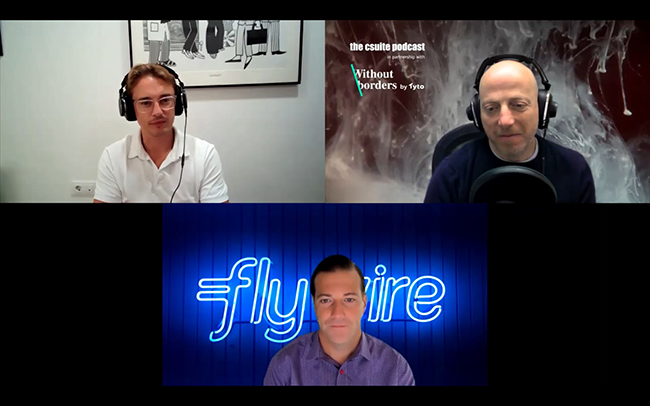Podcast - Interview with Mike Massaro, CEO, Flywire
Part of our special series of episodes that we're recording in partnership with the European PR Agency, Tyto, and their own Without Borders podcast, this interview is with Mike Massaro, CEO, Flywire.

Mike Massaro, CEO of Flywire joined Audere Communication’s Russell Goldsmith and Tyto PR’s Brendon Craigie online to record an interview for the csuite podcast’s special series on unicorn companies, that is produced in partnership with Tyto.

Brendon Craigie (top left) and Russell Goldsmith (top right) chat online to Mike Massaro, CEO, Flywire
Mike explained that Flywire focuses on the combination of software and payments coming together, which is a major trend in tech. Flywire started with an education vertical about 10 years ago, then added additional vertical markets, including health care, travel and business payments.
He said what is unique about Flywire, is they have a certain way they move the money. Flywire has one shared tech platform for payment functions and a vertical software that's super targeted for integration.
Mike said that there hasn’t been much of a change in the perception of the company since becoming a unicorn. He is one of the most anti-unicorn type people and is heavily focused on execution, the blood, sweat and tears that went into building the company for ten years. He said it's nice to have the label and to be held up as one of the hallmark companies in the fintech industry, but there's a lot more work to do.
This area of global payments is growing at roughly six percent annually and when asked what is driving the growth in payments, Mike said there's a digitisation that's happening and people are shifting away from cash. Before Covid, people were picking up, travelling, interested in seeing the world, learning, and potentially living in different places.
He said that this created a lot more digitisation and the drive to ecommerce. People used to go and select a payments vendor, but now, payments are embedded in everything we do. When you're delivering software like Flywire is to its clients, they don't have to make a payment decision right there and then.
If payments are part of the offering, then that's taking complexity and decision-making away from them. Mike added that when you have more seamlessly integrated software with payments, usage levels go up because it creates a better experience.
Mike said that you can deliver a lot of software to clients, delivering a ton of value, and that value can then be monetized either through software licensing or payment economics, or a combination of both. if you actually have the payments integrated in with the software, you end up with a little more flexibility when it comes to monetization.
Covid
Mike said the pandemic has definitely been quite an experience. Flywire have 65 employees in Asia Pacific, and a number of them started to be impacted even in January and February. This meant Flywire got an earlier view of what the potential implications were, for example having people shift and work remotely and some of the stresses that this kind of this environment causes.
He added that when it happened in the United States in mid-March, their focus was to make sure they could transition well to home and make sure people had the equipment they needed to perform their job to the to the best of their ability. This happened relatively easily for Flywire, being a globally distributed team, they used a lot of collaboration tools prior.
He added that Flywire played defence for a two-to-three-month period between March and early/mid-June. Then had to think about how to play more offense, as they realised this was going to be the new normal for a long time, as well as supporting their people and addressing some of the wellness or mental health issues that people are facing in a stressful time.
Values & Culture
Collaboration is one of the Flywire’s values, but despite building such a fast moving, high growth company culture, Flywire had ups and downs early on in the evolution of the company. Mike added that they picked their heads up about three years into the journey and that was the moment in which everybody kept referencing how great Flywire’s culture was.
He added, everybody who visited; investors, bank partners, all spoke about what they saw consistent across Flymates, even across very distant locations. Mike said that taking bad experiences you’ve had in the past and correcting them in the future is part of the journey, he added there's a lot of work that goes into building these companies and there is value to actually focusing on where you didn't get it right.
Mike said that a business driving the agenda relating to diversity, equity and inclusion is a critical thing on the mind of so many people. He said at Flywire, having a value around authenticity has been something they’ve tried to push for a long time internally, they want a diverse group of Flymates.
They have a group called Flymates First, who are the volunteer Diversity and Inclusion team, and are passionate about those topics and have helped navigate Flywire through a lot of different decisions recently.
Mike said that he is an introvert and people are often surprised at this, but he is good at faking it. He said being the external spokesperson has been something he has had to grow into in the 10 years at Flywire. He loves the industry and has been in tech for 20 years, a lot of that in payments, so building up that network has been amazing.
He said for him, the biggest challenge overall has probably been the pace, but the biggest communications challenge is that sometimes he is overly transparent. He said people may not want to know all the detail, and being that direct and that transparent may actually push these complex decisions onto other people that don't necessarily want them and show a level of uncertainty.
Advice
Mike said that great advice that he would like to pass on is from his chairman, who is on the board of a number of tech companies. Mike said, CEOs come to his chairman with these ridiculous challenges, but he has this ability to reflect before he answers.
Most people want to jump in with an answer, but he'll actually pause a conversation and take 30, 60, 90 seconds before even uttering another word, then he'll come out with a well thought out, well-articulated point. Mike said this is something he has been trying to work on. He said when it comes to communication, sometimes if you just take that pause, if you really think through it, you can actually organise your thoughts in a better way.
If Mike were to go back and speak to his old self, the guidance he would give about communications would be to understand who you're communicating to and how best to get your point across to that person, he said that uniqueness of an individual is really important.
People have broad communication strategies, where they try and do the same thing to different people, the reality is, it's a two-way street and has to work for both parties for the relationship to really be great.